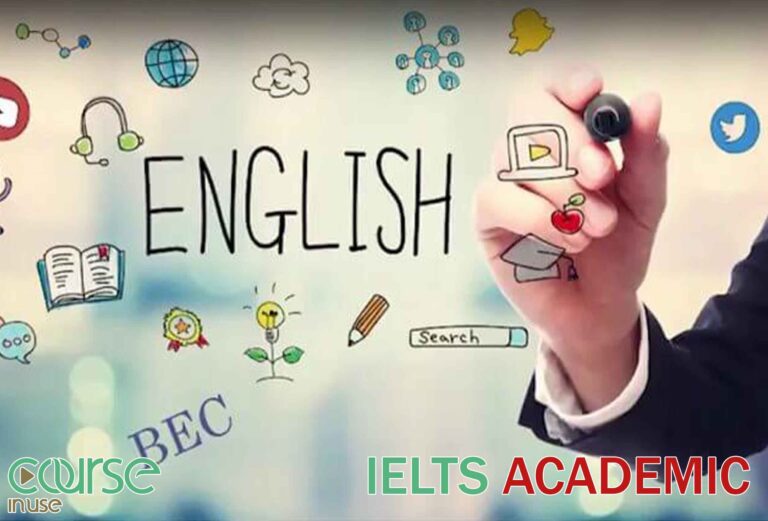International English Language Testing System
IELTS, which stands for the International English Language Testing System, is a widely recognized language proficiency test. It assesses the language abilities of individuals aiming to study, work, or integrate into English-speaking environments. The IELTS exam consists of four assessment components:
- Speaking: Evaluate your ability to communicate opinions and information on everyday topics and common experiences. Speaking Comprises a one-on-one conversation with the examiner. It includes three questions: general conversation, monologue on a general topic, and conversation related to academics.
- Listening: Assesses how well you understand ideas, recognize opinions, and follow the development of an argument. Listening Consists of 40 questions divided into four sections. The topics cover a wide range, including social welfare, education, and work.
- Writing: Measures your ability to organize ideas, write a response accurately, and use wide-ranging vocabulary and grammar. Writing, Involves two short essay questions, each based on a visual prompt or a situation. The essays should be around 150-200 words
- Reading: Tests your ability to read for general sense, main ideas, details, and understand the author’s inferences and opinions. Reading Includes three lengthy reading comprehension passages, totaling 40 questions. The passages explore various academic themes.
Note that depending on the purpose and needs of applicants, other tests such as TOEFL exam and PTE are also available to assess English language skills. Each of these tests has its own characteristics and structure that can be chosen according to individual conditions and goals.
What is the Purpose of the IELTS exam?
As mentioned, the IELTS exam is designed to assess individuals’ English language proficiency for various purposes, including academic, immigration, and employment. One of the significant aspects of the IELTS exam is its global recognition, being trusted by 12,000 organizations in over 140 countries, which positions it as the most popular English language proficiency test for higher education and global migration. It is noteworthy that among its benefits are real-world communication skills, which focus on the ability to use English in everyday situations. Moreover, it opens up global opportunities, including access to international educational institutions and the ability to communicate with English-speaking communities worldwide.
Types of IELTS exams
As it was said, IELTS is a set of tests that measure your mastery in the four skills of Speaking, Listening, Reading, and Writing, and you as an applicant should choose one of the types of IELTS tests according to your goals and needs. Let’s check the types of IELTS test in more detail below but in short, you should know that in both the academic and general training exams, the Speaking and Listening sections are not different from each other and only the Reading and Writing sections are different from each other. It should be noted that these differences are due to the assessment of language skills related to each section, in addition to the academic and general training test, there is another test from the IELTS test series, which is approved by the British government (UKVI). The IELTS for UKVI Life Skills test, which only evaluates your speaking and speaking skills, is suitable for people who intend to immigrate to the UK, and having this certificate is one of the stages of their visa application.
-
IELTS Academic:
- Purpose: If you plan to study in a country where English is spoken, this test is suitable for you. It assesses whether you’re ready to begin studying in English.
- Content: The vocabulary used is familiar within an academic setting.
- Additional Use: You can also take IELTS Academic for professional registration purposes.
- Sections: It includes Listening, Reading, Writing, and Speaking.
- Reading and Writing: These sections focus on academic language skills relevant to university studies.
- Scoring: Graded on a scale from 0 to 9.
-
IELTS General Training:
- Purpose: Suitable for those migrating to an English-speaking country (like Australia, Canada, New Zealand, or the UK) or those training/studying at below degree level.
- Content: Assesses everyday English language skills needed in social situations and workplaces.
- Sections: Also includes Listening, Reading, Writing, and Speaking.
- Reading and Writing: These sections focus on practical language skills.
- Scoring: Graded on the same scale as IELTS Academic.
-
IELTS for UKVI (UK Visas and Immigration):
- Accepted by UKVI as proof of English proficiency for visa applications.
- Required for various UK visas, including student visas, work visas, and family visas.
- Sections: Same as Academic and General Training.
- Scoring: Follows the same grading system.
IELTS Test Type Review
| IELTS Test Type | Purpose | Features | Applications |
| IELTS General Training | In order to immigrate to English-speaking countries for education below the university level. | Assessing the skills required by the applicant in everyday situations and work environments | Immigration Work experience Training School/College |
| IELTS Academic | University education in English | Focuses on academic English, featuring vocabulary common in academic settings. | – University – Higher education – Professional registration |
| IELTS for UKVI | Proof of proficiency in English for working and studying in the UK | In order to apply for a visa to the UK | British citizenship Family visa (extension) Health and Care Worker visa Indefinite leave to remain (family) Skilled Worker visa Student visa and more. |
IELTS exam scoring system
IELTS scores are reported on a nine-band scale, with each band corresponding to a specific level of English proficiency. Here’s what the bands represent:
- Band 9: Expert user – Fully operational command of the language.
- Band 8: Very good user – Very effective command of the language.
- Band 7: Good user – Operational command of the language.
- Band 6: Competent user – Effective command of the language despite some inaccuracies.
- Band 5: Modest user – Partial command of the language, coping with overall meaning.
- Band 4: Limited user – Basic competence, likely to make many mistakes.
- Band 3: Extremely limited user – Conveys and understands only general meaning.
- Band 2: Intermittent user – No real communication is possible except for basic information.
- Band 1: Non-user – Essentially no ability to use the language beyond a few isolated words.
- Band 0: Did not attempt the test.
What is the minimum IELTS score for universities?
The minimum IELTS score required for universities varies significantly depending on the institution, program, and country. Generally, universities set their minimum requirements, but here are some approximate guidelines:
1. Undergraduate Programs:
Many universities require an overall IELTS score of 6.0 to 7.0 for undergraduate admissions.
Some competitive programs or universities may have higher requirements (e.g., 7.5 or above).
2. Graduate Programs (Master’s and Ph.D.):
For graduate studies, universities often expect an overall IELTS score of 6.5 to 7.5.
Some top-tier universities may require 8.0 or higher.
3. Specific Programs:
Certain programs (e.g., medicine, law, engineering) may have stricter language requirements.
Always check the official website of the university or program you’re interested in for precise details.
4. Conditional Offers:
Some universities offer conditional admission if you meet specific language requirements during your first year of study.
Registering for the IELTS exam
Here are the steps you can follow:
- Choose the Right Test Type:
- Decide whether you need the IELTS Academic or IELTS General Training. The choice depends on your study, work, or immigration requirements. If you’re unsure, you can find more information on the official IELTS website.
- Select a Test Format:
- You can take the IELTS test either on paper or on a computer. Choose the format that suits you best⁶.
- Book Your Test:
- Visit the official IELTS website or the IDP IELTS website (depending on your location) to register.
- Select “Register for IELTS” and follow the instructions.
- Choose your preferred test format (paper-based or computer-based).
- Select your test location and available date.
- Complete the registration process and finalize your booking.
- Payment Options:
- You can pay online during the registration process or visit a local test center to pay in person⁴.
How long does each section of the IELTS exam take?
The IELTS test consists of four sections: Listening, Reading, Writing, and Speaking.
- Listening: Approximately 30 minutes.
- Reading: Around 60 minutes.
- Writing: About 60 minutes.
- Speaking: The Speaking section can be completed up to a week before or after the other tests and typically takes around 11 to 15 minutes.
In total, the IELTS test duration is 2 hours and 45 minutes.
IELTS registration
To register for your IELTS exam, follow these steps:
- Find a Test Center: Locate your nearest IELTS test center.
- Choose Test Type: Decide whether you want to take the computer-based or paper-based IELTS. Also, select between Academic IELTS and IELTS General Training.
- Select a Test Date: Pick a convenient test date.
- Create an Account: If you haven’t already, create an account on the official IELTS website.
- Provide Details: Fill in your application details, including your name (matching your ID), contact information, and other necessary information.
- Score Recipients: Choose where you want your IELTS scores to be sent.
- Review and Pay: Double-check your details and complete the payment process.
- Remember to have a valid identity document (national ID card or passport) ready for registration.
- You can also register through IDP IELTS or the British Council. Make sure to choose between IELTS Academic or IELTS General Training based on your goals.
IELTS Registration Fee
The IELTS registration fee varies depending on your location and the type of test you choose.
- United States: The IELTS test fee in the US typically ranges from $140 to USD 310. Most test centers charge a flat fee of $225.
- India: In India, the IELTS exam fees range from INR 14,600 to 15,750 depending on the type of IELTS test (Academic or General Training) and whether you take it on paper or a computer.
Remember to verify the exact fees with your local test center to ensure accuracy.
Different payment methods are available for paying the IELTS exam fee.
When paying the IELTS exam fee, you have several options:
- Online Payments: You can pay using credit/debit cards (Visa or MasterCard) or net banking.
- Bank Deposits: Make a direct deposit into the specified bank accounts.
- Demand Drafts: Create a demand draft payable to the authorized IELTS test centers.
Remember to follow the specific instructions provided by your chosen payment method.
Documents required for the IELTS registration
When registering for the IELTS exam, you’ll need to provide the following documents:
- Copy of IELTS Test Application Acknowledgment: This is received after registering online.
- Proof of Fee Payment: You can show either a demand draft or the British Council Copy of the ICICI bank payment slip.
- Valid Passport or National ID: The same identification document you used during registration is essential for test day. Make sure it’s not expired.
Remember that you don’t need to bring passport photos on the test day. Instead, the IELTS test center will take your photo during registration. For the IELTS on paper test, you are allowed to bring pens, pencils, and erasers. However, for the IELTS on computer test, paper and pencils will be provided for you. Additionally, mobile phones are permitted, but they must be switched off and placed with your other personal belongings in a designated area. Valuables are not recommended, and electronic items are not allowed in the test room.
Documents required for the IELTS test
When taking the IELTS exam, you’ll need to bring the following documents with you:
- Valid Passport or National ID: The same identification document you used during registration is essential for test day. Make sure it’s not expired.
- Admission Ticket: The confirmation email you received after registration serves as your admission ticket.
IELTS expiry: The IELTS score remains valid for two years from the date you took the test.
Preparation for the IELTS exam
Preparing for the IELTS exam is essential to achieve your desired score. Here are some steps you can follow:
- Understand the Test Format: Familiarize yourself with the IELTS exam format. Know the different sections (listening, reading, writing, and speaking) and their requirements¹.
- Create a Study Schedule: Set aside dedicated study time. Consistency is key! Allocate time for each section and practice regularly.
- Join a Preparation Course: Consider enrolling in an IELTS preparation course. These courses provide structured guidance and practice materials.
4 . Practice with Sample Questions: Use official IELTS sample questions to improve your skills. Work on your listening, reading, writing, and speaking abilities.
- Surround Yourself with English: Immerse yourself in English. Read English books, watch English movies, and listen to English podcasts.
- Perfect Your IELTS Skills: Focus on areas where you need improvement. Practice writing essays, speaking confidently, and understanding different accents.
Best IELTS test resources
IELTS test resources typically refer to the materials and tools available to help individuals prepare for the International English Language Testing System (IELTS) exam. These resources are crucial for candidates aiming to improve their English language proficiency across the four key areas tested in IELTS: Listening, Reading, Writing, and Speaking. Here are some common types of IELTS test resources:
- Official IELTS Websites: Websites like the British Council’s IELTS and IDP Education offer comprehensive information about the test format, test dates, registration procedures, and preparation tips.
- Practice Tests: Official IELTS practice tests are invaluable for familiarizing oneself with the exam format, timing, and question types. They help candidates assess their readiness and identify areas needing improvement.
- IELTS Preparation Books: Numerous publishers offer IELTS preparation books that include practice tests, tips, and strategies for each section of the exam. These books often come with audio CDs for listening practice.
- Online Courses and Tutorials: Many online platforms provide IELTS preparation courses and tutorials. These can range from free resources on YouTube to structured courses on platforms like Udemy, Coursera, or dedicated IELTS preparation websites.
- Mobile Apps: There are various mobile applications specifically designed for IELTS preparation. These apps offer practice tests, vocabulary exercises, and tips that can be accessed anytime, anywhere.
- Language Schools and Tutoring Services: Language schools and private tutors often offer IELTS preparation classes. These classes provide personalized instruction and feedback to help candidates improve their skills.
- Study Groups and Forums: Joining study groups or online forums dedicated to IELTS preparation can provide peer support, shared resources, and valuable insights from others preparing for the exam.
These resources collectively aim to enhance candidates’ English language skills and familiarize them with the structure and expectations of the IELTS exam, thereby increasing their chances of achieving their desired band score.
Attention:
IELTS Eligibility 2024:
In general, there is no specific age limit for the IELTS exam, but according to IDP, the minimum age to take the IELTS exam in 2024 is 16 years.
Course In Use website is the best Comprehensive resources for learning international online courses and preparing for international exams.




